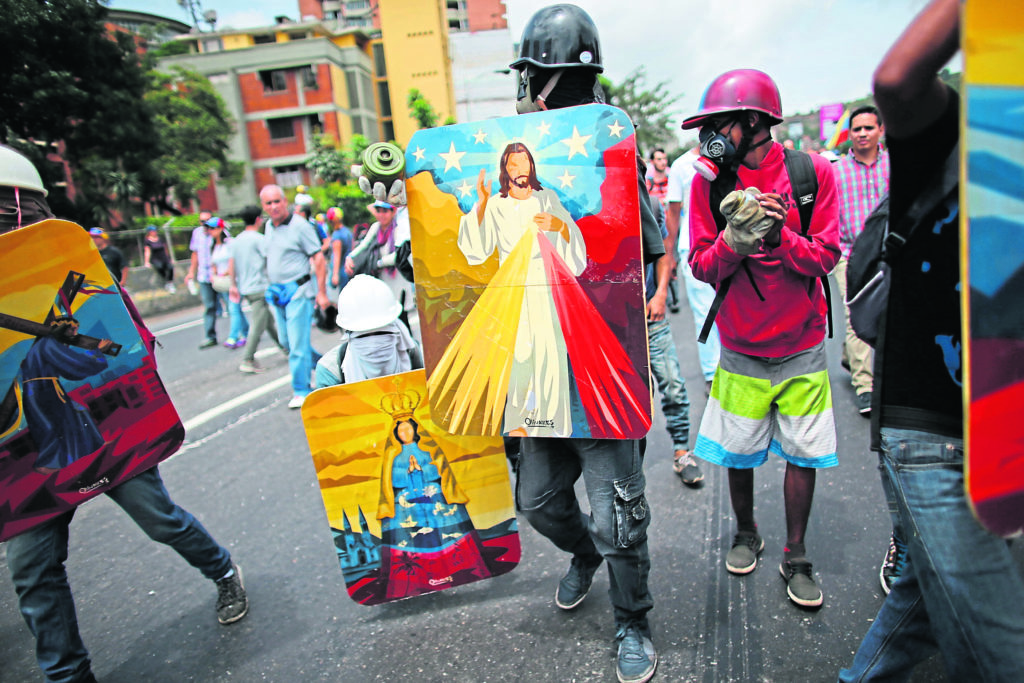
It is a well-proven maxim that discovering oil can be more of a curse than a blessing and nowhere on the face of the Earth offers better testimony to that than Venezuela, now in the throes of political upheaval.
The prize at stake is a wrecked economy, mass emigration, terrible poverty and an oil industry which is in chronic need of investment in order to stagger on, far less fund any kind of recovery.
Hard to believe that this is the country with the world’s biggest proven oil reserves.
Of course, much of the immediate fault can be attributed to the disastrous government of Nicolas Maduro and even more to his predecessor as president, Hugo Chavez. It is too conveniently simplistic, however, to lay all responsibility at their doors for Venezuela’s problems go back far further than that.
I first visited the country as trade minister almost 20 years ago in the early days of Chavez’s rule. It is worth remembering the circumstances in which he came to power. Parts of the country had been hit with flooding and so feeble were the hovels which clung to the hillsides that 30,000 people died as a result.
It was an episode which crystalised the great Venezuelan enigma.It had been an oil-rich state for three-quarters of a century yet the social and economic infrastructure of the country was an absolute disgrace.
While a wealthy elite flew back and forth between Caracas and Miami, the vast majority of the people lived in poverty. It was they who voted for Chavez, a Bolivarian populist who promised change.
By the late 1930s, Venezuela had become the world’s third biggest oil producer and also the number one exporter. However, it was already suffering from “Dutch Disease”, the curse of many oil-rich economies.
The first stage is for other industries to fall by the wayside – most critically agriculture. Then the strength of an oil-based currency makes importing expensive.
Venezuela has had 80 years of these chronic ailments with high oil prices the only intermittent remedy. The oil industry was nationalised in 1976 and the state company, PDVSA, became a major player globally as well as dominating the domestic economy. It was a generally well run company but increasingly wanted to invest the wealth it generated rather than hand it over to the government for social programmes.
Chavez railed against PDVSA as a “state within a state” which is a common charge against such companies. He drove out the competent management and replaced it with his own people who knew little or nothing about running an international oil company.
At the same time, he syphoned off increasing shares of oil revenue for social programmes and aid to other poor countries. There is no doubt that this was transformational for the lives of many poor Venezuelans and also beneficial to regional allies, notably Cuba with whom Chavez ran a vast “oil in exchange for doctors and teachers” trade.
As long as there was money to fund these programmes, they ensured Chavez of enough popular support to win elections and, in 2002, to successfully resist a Washington-sponsored attempt at a coup.
But the warning signs were not hard to find. A decade ago, I gave some assistance to the Scotch Whisky industry which was trying to stave off the attentions of the Chavez government.
Incredibly, Venezuela was the fifth biggest market for Scotch in the world but Chavez had taken to denouncing it as the “drink of the oligarchs” and demanding that patriots should drink rum instead.
By that time, it was pretty apparent that the country was on a one-way ticket to disaster and also to authoritarian rule. Oil production in the traditional fields around Lake Maracaibo was in sharp decline.
The big hope lay in exploiting the vast resources of heavy oil in the Orinoco basin where necessity had dictated the involvement of foreign companies to invest alongside PDVSA. However, time was not on Venezuela’s side and it might be said that Chavez got out just in time by dying in 2013. By then, the price of oil was in sharp decline.
His anointed successor, Maduro, had to deal with the fall-out – a role for which he was singularly ill-equipped. The past five years have seen a rapid acceleration in poverty, hyper-inflation and emigration.
It would be naive to doubt that the Americans have worked night and day to destabilise the country from the day Chavez was elected.
In Latin America, that remains a “given” whenever any leftist government raises its head. But that alone cannot be blamed for the chaos that now exists and which threatens to destabilise neighbouring countries.
Maduro has looked increasingly to China and Russia for support and they both have strong interests in what happens next – as well as very large debts to collect.
What would once have been seen by the rest of the world as a disturbance within America’s “backyard” is now caught up in much wider geopolitics even if everyone agrees that “something has to be done” on humanitarian grounds, let alone economic ones.
Ideological point-scoring will not do much good for the poor Venezuelan people. For a brief period, they voted for a government which offered the prospect of radical change only to see their hopes dashed by forces far beyond their control – falling oil price – allied to the incompetence of politicians in whom they had placed their trust.
The fact remains that Venezuela has the largest confirmed oil reserves on our planet. It should not have been beyond the wit of man, over the past century, to exploit them in a way that created benefits for the whole society to share in. For Venezuela and many other oil-rich countries, that remains the elusive prize.
Brian Wilson is a former UK energy minister